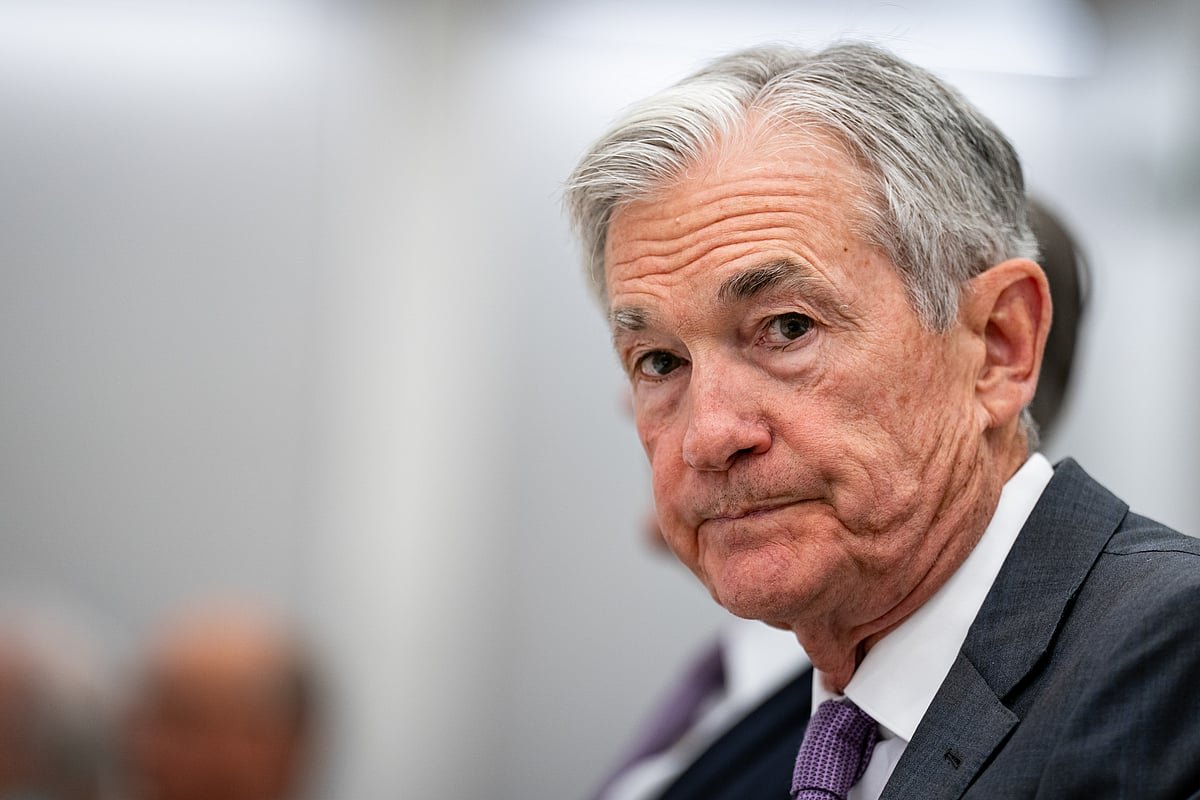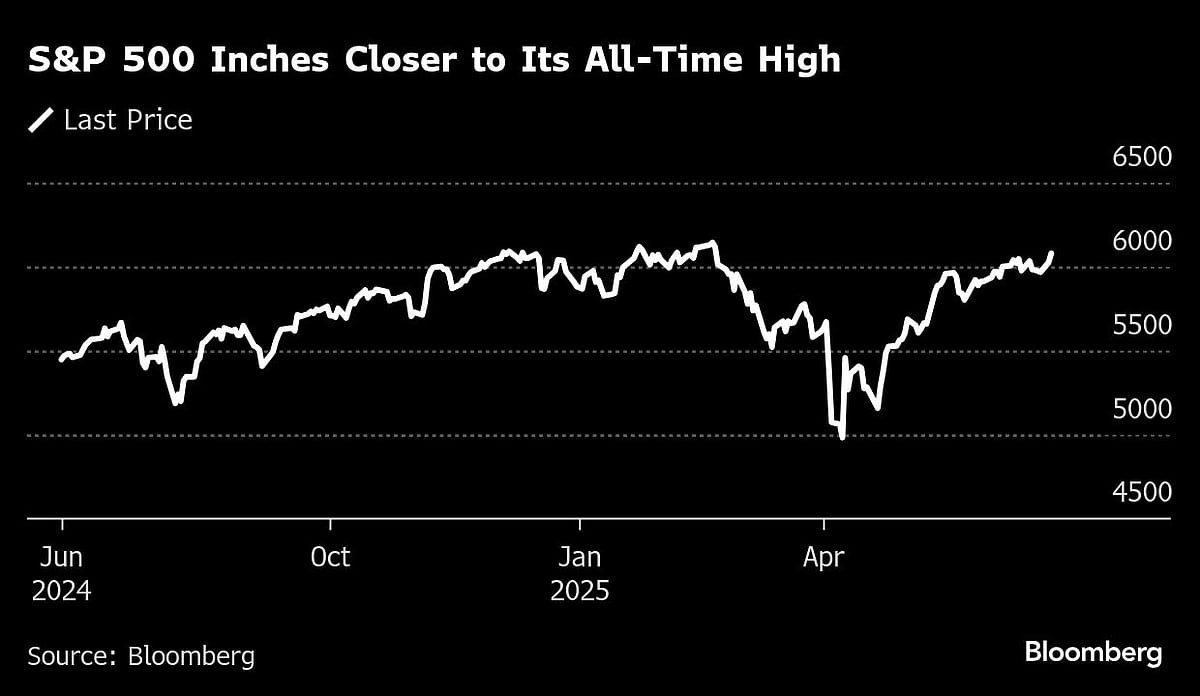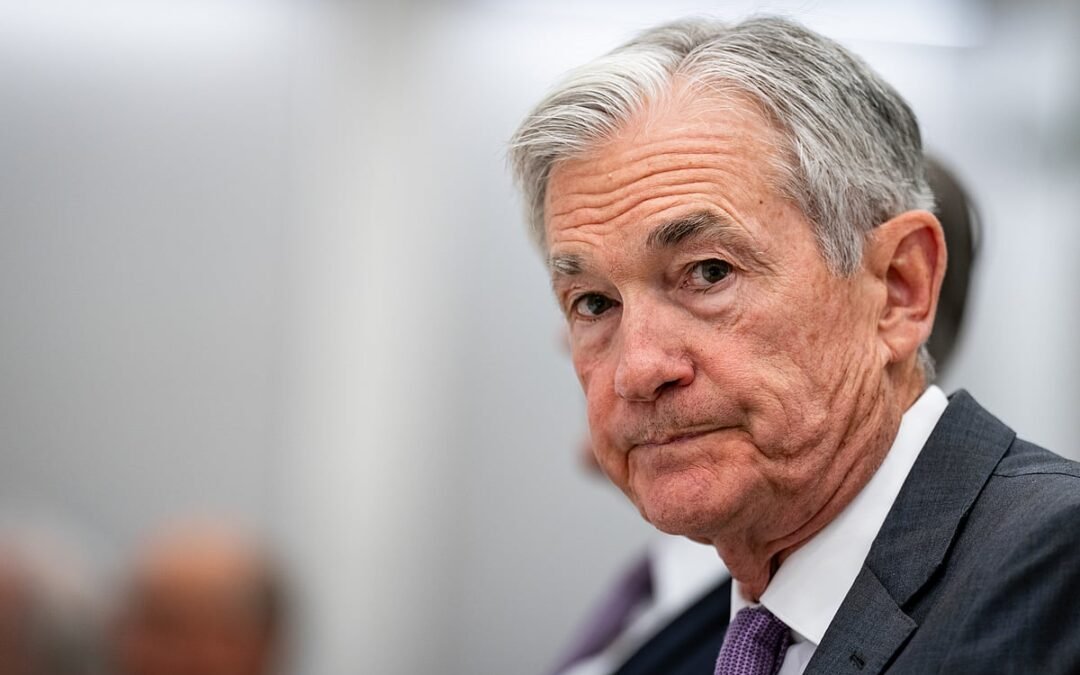A rally that drove stocks to closer to their all-time highs powered ahead on hopes that a de-escalation of the Middle East conflict will prevent a flare-up in inflation, with the market extending gains after Federal Reserve Chair Jerome Powell said “many paths are possible” for monetary policy. Bond yields and the dollar fell. Oil plunged.
The S&P 500 rose almost 1%. Should inflation come in weaker than expected or the labor market deteriorate, Powell said, the Fed could cut rates sooner. Treasury two-year yields slipped toward the lowest since early May. Money markets fully priced in two Fed reductions by the end of the year, with odds of a July cut near 20% from roughly zero a week ago. Bets on policy easing also grew after a slide in consumer confidence.

Jerome Powell.
“If it turns out that inflation pressures do remain contained, then we will get to a place where we cut rates, sooner rather than later,” Powell said in response to a question about the possibility of a July rate cut. “But I wouldn’t want to point to a particular meeting. I don’t think we need to be in any rush because the economy is still strong.”
Powell’s remarks before the House Financial Services Committee come on the heels of the Fed’s decision last week to leave interest rates unchanged for a fourth consecutive meeting. Fed Governors Christopher Waller and Michelle Bowman have pointed to that dynamic, among other factors, in arguing the Fed could cut as soon as its next meeting in July.
“Investors and consumers remain cautious but hopeful as they turn their attention to the second half of the year,” said Bret Kenwell at eToro. “While US stocks are near record highs, the focus will soon shift to earnings season and the Fed’s next meeting in late July.”
Traders continued to keep a very close eye on Middle East developments, with President Donald Trump. telling the reporters he believed the truce would hold, even if it was being tested. Israel and Iran appeared to be honoring a ceasefire agreement.

“Stocks are moving higher on news of a ceasefire between Iran and Israel and the idea that this will remain a short-lived war, rather than a long and drawn out conflict,” said Chris Brigati at SWBC. “This de-escalation is leading investors to be more comfortable engaging in risk-on trades in the equity market.”
Trump announced the ceasefire late Monday, less than 48 hours after the US entered the conflict directly with attacks on the Islamic Republic’s nuclear facilities. That followed a well-telegraphed attack by Iran on a US air base in Qatar that was widely viewed as de-escalatory.
“A lot can happen obviously still happen with this war, so nobody is going to send up a ‘Mission Accomplished’ signal,” said Matt Maley at Miller Tabak. “However, the risks involved with this conflict have certainly fallen meaningfully over the past few days”
Having said that, Maley says the risk/reward equation is still skewed heavily towards the risk side.
“The stock market is still very expensive at a time where the level growth in the US economy is falling and earnings estimates are falling,” Maley said. “Investors should be careful about assuming that this good news on the geopolitical front is something that will cause the market to rally substantially higher.”
The risks facing the stock market are swiftly diminishing as economic growth remains solid despite the turmoil from tariffs and geopolitics. Equities have been remarkably resilient over the past two months as the S&P 500 bounced sharply from April lows, putting it 2% away from its record high.
“It’s dangerous for investors to overreact on such events which typically turn out to be entry points rather than lasting selloffs,” Barclays Plc strategist Emmanuel Cau said. “This could actually end up as a bullish factor for stocks over the medium term.”
Corporate Highlights:
-
Microsoft Corp. will conduct another round of major layoffs in its Xbox division next week as part of a company-wide reorganization.
-
McDonald’s Corp. and Krispy Kreme Inc. are ending their partnership after a little more than a year, with the doughnut chain citing cost issues.
-
Uber Technologies Inc. will begin offering its customers driverless Waymo rides in Atlanta, making it the second market, after Austin, where the two companies are teaming up instead of competing against each other.
-
Lyft Inc. was raised to buy at TD Cowen, which cited multiple growth levers.
-
Starbucks Corp. said it’s not currently considering a full sale of its China business, disputing a report from Caixin Global, as the coffee giant battles cheaper local rivals in its second-biggest market.
-
Spain’s government told BBVA SA that it won’t be able to integrate Banco Sabadell SA for several years if it goes ahead with its unsolicited takeover offer, in another setback to the proposed €14 billion ($16 billion) deal.
-
Novo Nordisk A/S is hunting for more early-stage deals to pad its pipeline of next-generation obesity drugs, as the drugmaker struggles to fend off rivals in the burgeoning weight-loss market it helped pioneer.
Some of the main moves in markets:
Stocks
-
The S&P 500 rose 0.9% as of 11:30 a.m. New York time
-
The Nasdaq 100 rose 1.3%
-
The Dow Jones Industrial Average rose 0.9%
-
The Stoxx Europe 600 rose 1.1%
-
The MSCI World Index rose 1.2%
-
Bloomberg Magnificent 7 Total Return Index rose 0.9%
-
The Russell 2000 Index rose 1.3%
Currencies
-
The Bloomberg Dollar Spot Index fell 0.6%
-
The euro rose 0.4% to $1.1627
-
The British pound rose 0.8% to $1.3627
-
The Japanese yen rose 1% to 144.74 per dollar
Cryptocurrencies
-
Bitcoin rose 1.8% to $105,708.51
-
Ether rose 3.8% to $2,436.89
Bonds
-
The yield on 10-year Treasuries declined five basis points to 4.29%
-
Germany’s 10-year yield advanced three basis points to 2.53%
-
Britain’s 10-year yield declined three basis points to 4.46%
Commodities
-
West Texas Intermediate crude fell 4.7% to $65.31 a barrel
-
Spot gold fell 1.6% to $3,314.28 an ounce
. Read more on Markets by NDTV Profit.

